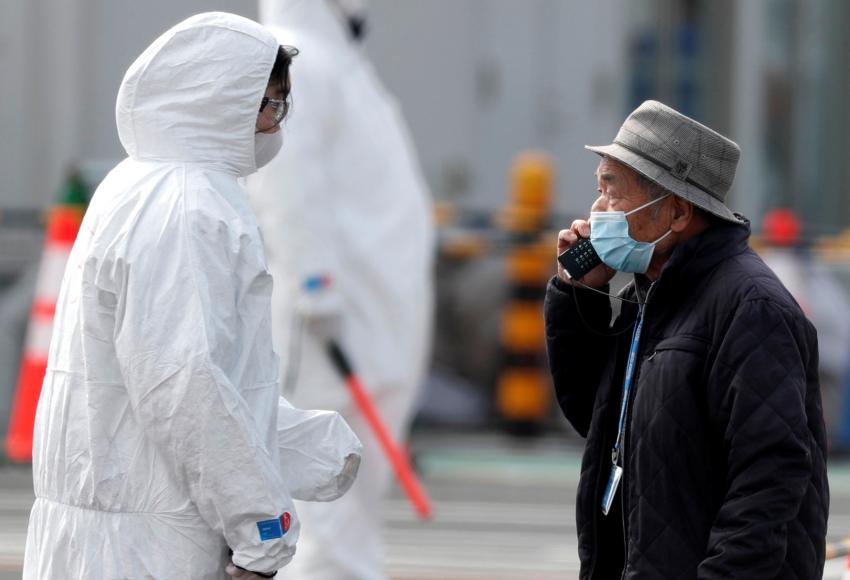消息 | 横滨邮轮两名老人死于新冠病毒感染,累计感染已至620人
 A worker in protective gear stands with a disembarking passenger from the coronavirus-hit Diamond Princess cruise ship docked at Yokohama Port on Thursday. Photo: REUTERS/Kim Kyung-Hoon
A worker in protective gear stands with a disembarking passenger from the coronavirus-hit Diamond Princess cruise ship docked at Yokohama Port on Thursday. Photo: REUTERS/Kim Kyung-Hoon
Gov't says 2 elderly people from cruise ship have died; another 2 officials infected with coronavirus
By Linda Sieg and Chang-Ran Kim
TOKYO —— The Japanese government said on Thursday that two people from the cruise ship berthed in Japan, both in their 80s, have died from coronavirus infections and that another two government officials have tested positive for the infection.
One of the officials was from the Health Ministry and the other from the Cabinet Secretariat, and both had worked on the Diamond Princess, a health ministry official told a news conference.
Three other officials, from the health ministry and quarantine office, had previously tested positive for the virus.
More than 620 of the passengers on the Diamond Princess liner have been infected on the ship, which has been quarantined since Feb 3, initially with about 3,700 people on board.
The deceased passengers were an 87-year-old Japanese man and an 84-year-old Japanese woman. After leaving the ship, they had been transported to a medical facility. One died of the coronavirus, the other of pneumonia, the health ministry said. Kyodo News reported that 29 passengers from the cruise ship in their 40s to 80s, including 15 Japanese nationals, are in a serious condition.
Japan has well over half the known cases outside China due to the ship infections and the rapid spread of the virus and the quarantine operation has sparked criticism of authorities just months before Tokyo is due to host the Summer Olympics.
Chief Cabinet Secretary Yoshihide Suga defended Japan's efforts. He told a news conference that after measures were put in place to isolate passengers on Feb. 5, the number of new infections was now almost at zero. "In that sense, we believe the isolation was effective," he said.
Japan's National Institute of Infectious Diseases (NIID) said in a report issued Wednesday that no new cases of the onset of the COVID-19 disease from the cruise ship were reported on Feb 16-17 and only one crew member case on Feb 15.
In a move to reassure the public, the health ministry also issued a statement in both English and Japanese that said all passengers had been required to stay in their cabins since Feb 5 to contain the virus. The day before, as passengers were being screened, ship events continued, including dances, quiz games and an exercise class.
Criticism of the government has played out in social media as well as in parliament, where Health Minister Katsunobu Kato was grilled again on Thursday by an opposition lawmaker.
About 500 passengers began disembarking on Thursday while another 100 people were to leave for chartered flights home, a health ministry official said.
An initial batch of passengers who had tested negative and shown no symptoms left the vessel on Wednesday.
Those who have shared a room with people testing positive were required to remain in quarantine, as were crew. The ministry could not confirm how many people remained on board, or when disembarkation would be complete.
More than 150 Australian passengers arrived home after a pre-dawn departure from Tokyo's Haneda airport. They face another 14-day quarantine.
Some Hong Kong passengers also went home, while Canadians were due to leave on a charter flight in the early hours of Friday, a Canadian government spokeswoman said. An evacuation flight was also being arranged for British nationals to leave Tokyo on Friday.
Earlier in the week, the United States evacuated more than 300 nationals on two chartered flights.
A U.S. State Department official said there were still about 45 U.S. citizens on board the cruise ship as of Thursday.
Americans flown back will have to complete another 14 days quarantine, as will returning Hong Kong residents.
Disembarked Japanese passengers, however, face no such restrictions, a decision that has sparked concern.
The NIID said there should be no problem if people had shown no symptoms for 14 days and had tested negative for the virus during the period their health was under surveillance.
Besides those on the cruise liner and returnees brought home from the epicenter of the epidemic Wuhan in China, about 70 cases of domestic infections have been confirmed in Japan, including 25 in Tokyo, public broadcaster NHK reported.